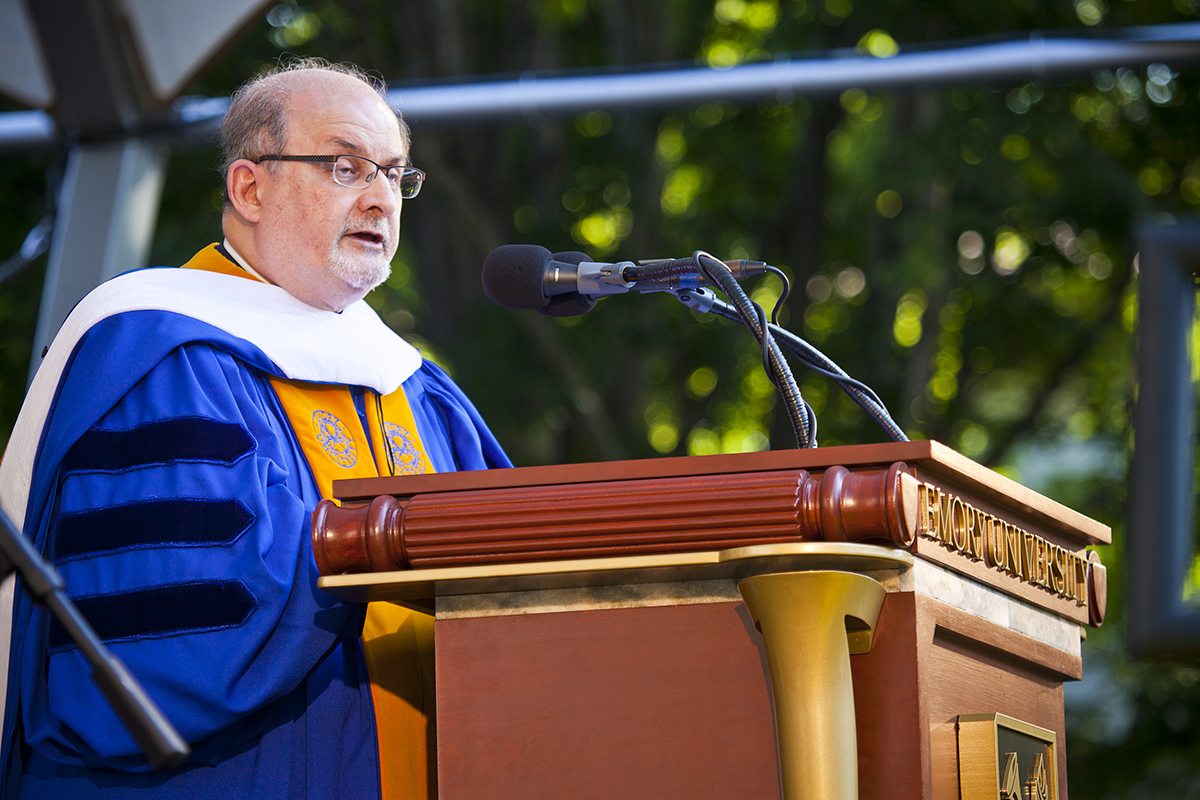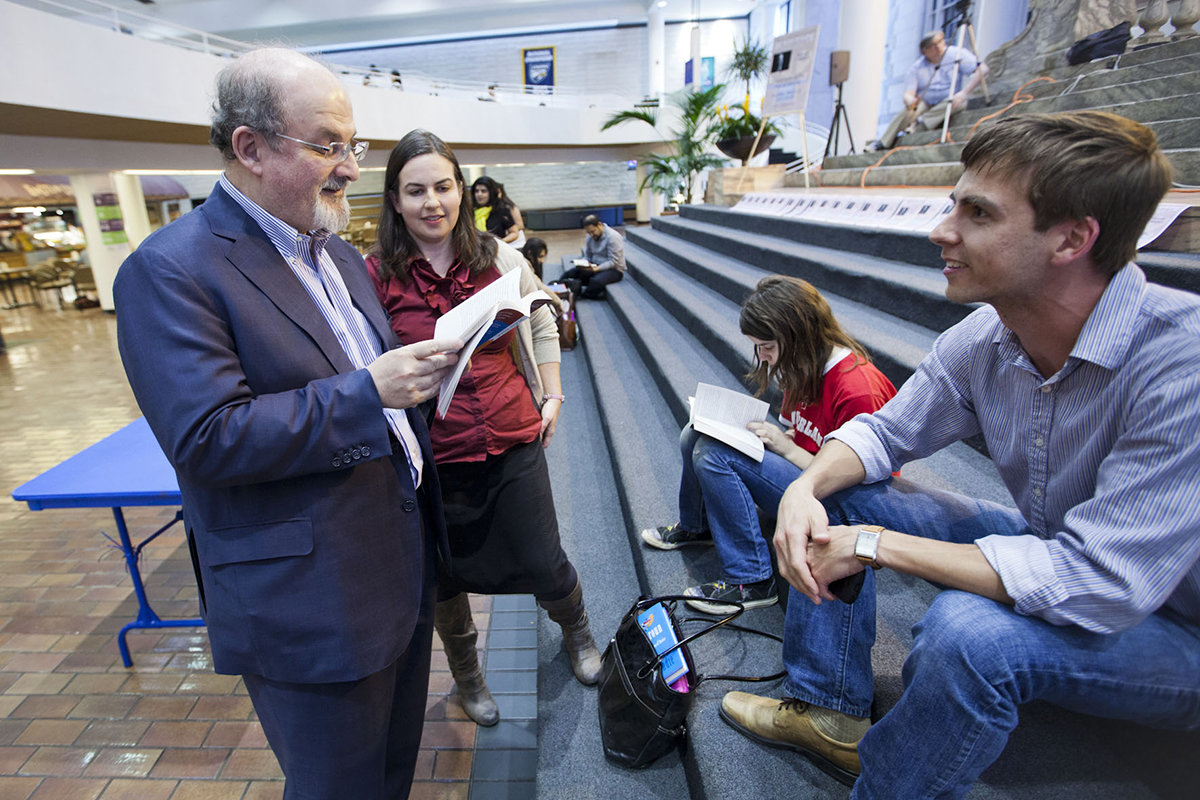The Emory community joins others around the world in sending well wishes to author Salman Rushdie, whose long relationship with the university includes serving as a distinguished professor, speaking at Commencement and placing his archives here.
Rushdie, 75, was attacked on stage at a lecture appearance in New York on Friday, Aug. 12. On Sunday, Rushdie’s agent said that the acclaimed writer, who suffered stab wounds to his neck and abdomen, was off a ventilator and beginning a long recovery process.
“I am relieved to hear that Salman Rushdie is recovering after a cowardly and terrifying attack. … He is an author of singular talents and unmatched courage — fearlessly defending free speech and expression,” Emory President Gregory L. Fenves shared on social media. “Our community sends our thoughts and well wishes to him and his family.”
Rushdie’s relationship with Emory began when he delivered the 2004 Richard Ellmann Lectures in Modern Literature. He joined Emory as Distinguished Writer in Residence in the English Department in 2006.
That same year, he placed his extensive archives in Emory’s Stuart A. Rose Manuscript, Archives and Rare Book Library, where they are available to researchers by appointment — and where Rushdie himself visited frequently to write his 2012 memoir, “Joseph Anton.” The book documented for the first time his years spent in hiding following the fatwa issued against him in 1989 by Iran’s Ayatollah Khomeini, after the publication of Rushdie’s novel “The Satanic Verses.”
"In 2006, when the library acquired the papers of Salman Rushdie, the acquisition marked an important commitment to the long-term stewardship of the thoughts and writings of one of the greatest writers of our time. Rushdie’s papers, documenting the arc of his career as a writer, are a cornerstone of literary cultural heritage holdings in the Rose Library that, together, help tell the story of our modern world," Emory Libraries noted in a statement.
"The Rose Library condemns the violent attack on his life and the freedom of thought and expression. Our thoughts and wishes are with Salman Rushdie’s family and every member of our inquiry-driven, ethically engaged, and diverse community."
In 2011, Rushdie became University Distinguished Professor in Emory College of Arts and Sciences, a position he held until 2015.
Delivering the Emory University Commencement address that year, Rushdie encouraged graduates to whet an appetite for the challenges before them and, using the intellectual tools provided by their liberal arts education, to “go out there and swallow the world.”
“Make no mistake, you can change things,” said Rushdie, who was awarded an honorary doctor of letters degree during the ceremony. “Don’t believe anyone who tells you that you can’t.”
Concluding his remarks, Rushdie apologized to new graduates for the failures of his own generation and “for the mess we are leaving — the whole ecological, fanatical, oligarchic mess.”
“We thought of ourselves, my lot, as tolerant and progressive, and we are leaving you an intolerant and retrogressive world,” he said. “But it’s a resilient place, the world, and its beauty is still breathtaking, its potential still astonishing, and as for the mess we’ve made, you can change it, and I believe you’re going to.
“We are language animals, we are dreaming creatures,” Rushdie said. “So dream. Speak. Reinvent the world.”

In 2015, Salman Rushdie delivered the keynote address at Emory’s 170th Commencement.
The author in the classroom
During his first five years at Emory, Rushdie taught a month-long graduate seminar to a select group of students. During his remaining years as University Distinguished Professor, his time on campus each spring was widely divided, as Rushdie assumed the role of guest lecturer, addressing multiple classes as well as giving public talks.
“It’s been a uniformly good experience,” Rushdie reflected in a 2015 interview as he concluded his professorship. “I’ve never really had an experience like this of being inside an academic institution over a long period of time — it’s the only time I’ve ever done it. And it’s been educational.”
“That’s what you hope will happen — that you get as much from it as you offer, and there’s no question that’s been the case,” he added. “I don’t think I regret a minute of it; it’s been very good for me.”
The celebrated author taught or contributed to a wide range of courses stretching across the humanities and social sciences, in disciplines that included literature, creative writing, film and media studies, philosophy, psychology, history, Middle Eastern and South Asian studies and more.
Among the many undergraduate courses graced by Rushdie’s lectures was English professor Sheila Cavanagh’s “Shakespeare, Text and Performance” class. During one 2014 visit, Rushdie dissected the finer points of “Twelfth Night” — running lines with students and discussing recent theatrical productions.
Thinking about the visit at the time, Cavanagh noted that the vast majority of her students “are not going to become Shakespeare professors or Shakespeare actors,” but the chance to have one-on-one conversations with Rushdie about Shakespeare’s plays was, in some ways, “the embodiment of a liberal arts education.”
“I want students to go away with some sense of the intellectual excitement, the pleasure of language and ideas, so that at some point they can talk about this and make it part of their intellectual and cultural life, linking things together,” she said then. “That’s something that Salman Rushdie represents — having an eclectic mind, pulling things together in ways students might not have thought about.”

During a 2012 visit, Salman Rushdie joined with students for a public reading of his children’s book "Haroun and the Sea of Stories" in the old Dobbs University Center.

